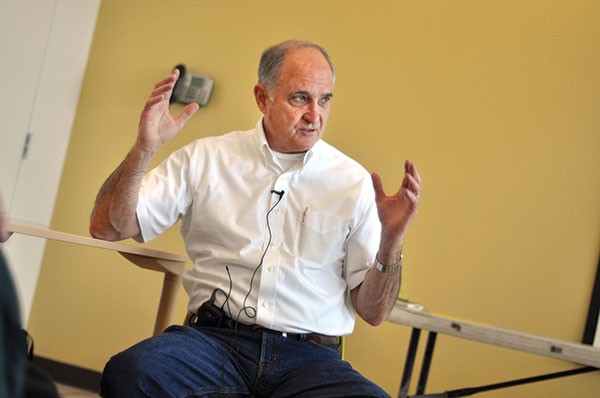In April, City Paper ran a suite of articles about how Pittsburgh might become a green role model for other towns by creating citywide programs to conserve energy, move to renewables and reimagine how we handle transit, trash and sewage. If the federal government is shirking its duty to act on climate change, we figure, locals must lead.
Turns out there's a town not too far west already earning role-model status. The Oberlin Project is working to minimize Oberlin, Ohio's carbon footprint, remake its downtown, conserve land, feed itself more locally — and get as many other cities as possible to follow suit.
The project seeks to create what its founder, author and environmentalist David Orr, calls "full-spectrum sustainability." This isn't a series of isolated "green buildings" and community gardens, but an integrated plan that involves, benefits and strengthens the whole community — in this case, a small Rust Belt college town of 10,000 — at once.
The Project is a joint venture of Oberlin College, where Orr teaches, and the City of Oberlin. It has four big goals: (1) rebuild a 13-acre downtown block to rigorous green-building standards as an economic driver; (2) become carbon-neutral by boosting efficiency and switching to renewables; (3) develop a regional, 20,000-acre green belt to preserve forests and farmland, while growing enough food to supply 70 percent of local needs; and (4) get area schools, from public grade schools to the college, to educate young people on sustainability, so they can thrive in an economy no longer dependent on cheap fossil fuels.
The Oberlin Project is only a few years old, and just got paid staff in late 2011. But it's already seeing results, says Orr, who spoke in Pittsburgh last week at the Inspire Speakers Series, organized by Phipps Conservatory and the Green Building Alliance.
In Oberlin's Green Arts District (located mostly on college-owned land), a century-old art museum has been renovated to high-performing LEED Gold standards, and construction will soon begin on a small LEED Platinum hotel — all part of the plan to enliven downtown. City government, meanwhile, employs an "energy advocate" to help homeowners cut energy use and connect with government and utility-company efficiency programs. Officials have also begun working to make its streets friendlier to bikers and walkers. City manager Eric Norenberg says that through a mix of energy sources including landfill gas, wind, solar and hydro, the traditionally coal-fired town (which owns its electric utility) hopes to be on 90 percent renewable electricity by 2016. And Orr says people are working to connect area farmers to markets in town and "make a smarter public" by incorporating sustainability into school curriculums.
The Oberlin Project has a long way to go. Its measure of carbon neutrality, for instance, doesn't account for heating or cooling buildings, a huge chunk of energy use. And Orr, who regularly emphasizes our dire need to act now to avert future climate catastrophes, says that if the Project doesn't inspire imitators, it will have failed no matter how well Oberlin itself does.
In fact, others elsewhere are thinking similarly. At the May 9 Phipps event where Orr spoke, presenters included Fred Brown of Pittsburgh's Kingsley Association. Brown has helped guide residents of Larimer toward a holistic green plan for their low-income neighborhood, where residents could use things like lower energy bills and better access to fresh food. And local architect and sustainability advocate Christine Mondor, who's also worked with Larimer, explained the "living city" concept, which closely echoes Orr's full-spectrum sustainability and the "ecodistrict" concept catching on nationally.
Oberlin's experience shows how much even a town with a 28 percent poverty rate can accomplish. And it's all possible, says Orr, when people who usually work in isolation get together and make everybody a stakeholder — government, business, educators, residents. "The key to full-spectrum sustainability is to get people talking across boundaries," he says.
Orrr notes that the Oberlin Project had an advantage: It was launched just as the city got a new manager, the college a new president and the school district a new superintendent.
The new leaders, he says, "seized on the idea. It was the right moment."
Could Pittsburgh, electing a new mayor this year, warrant such a moment?


